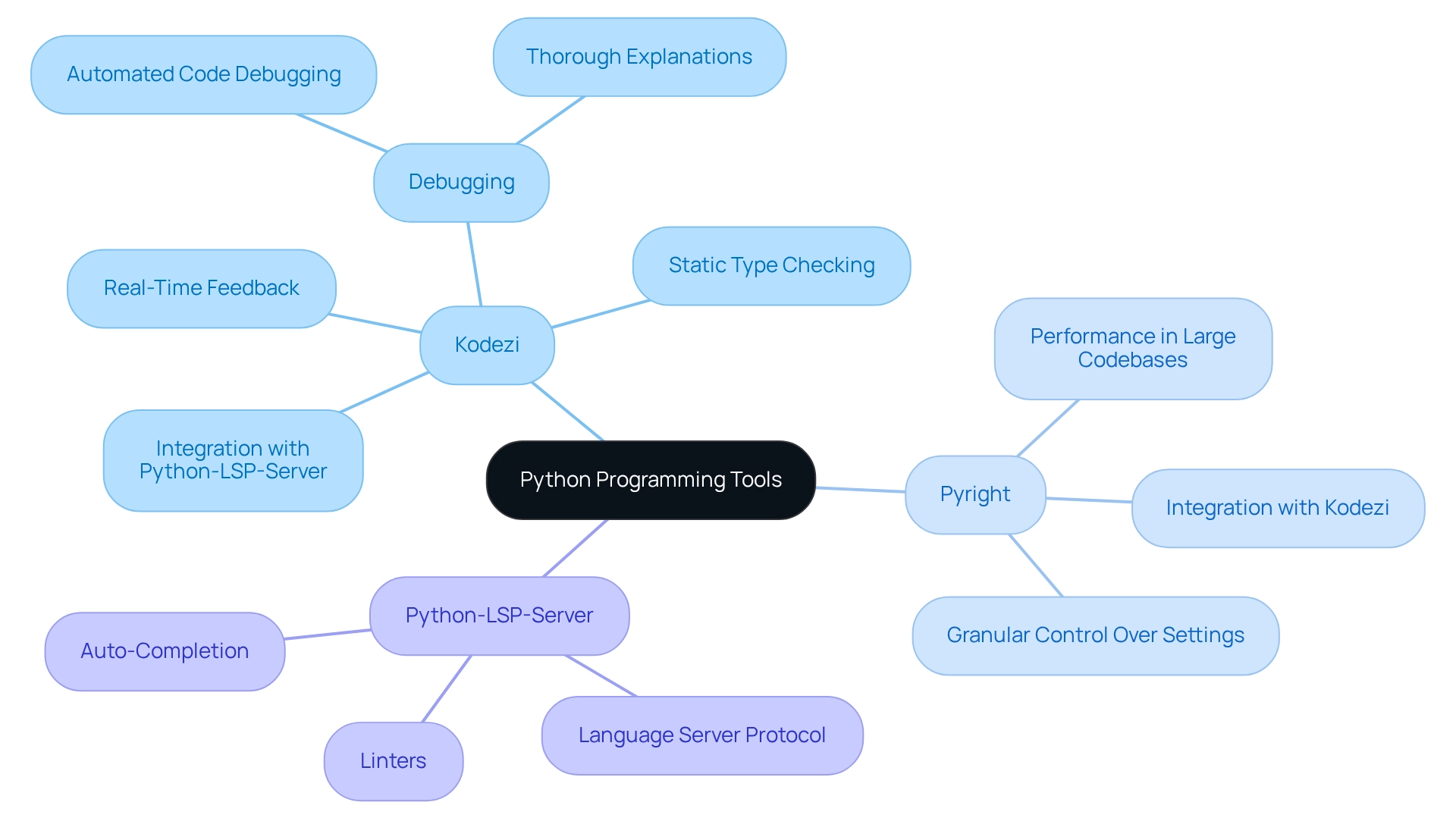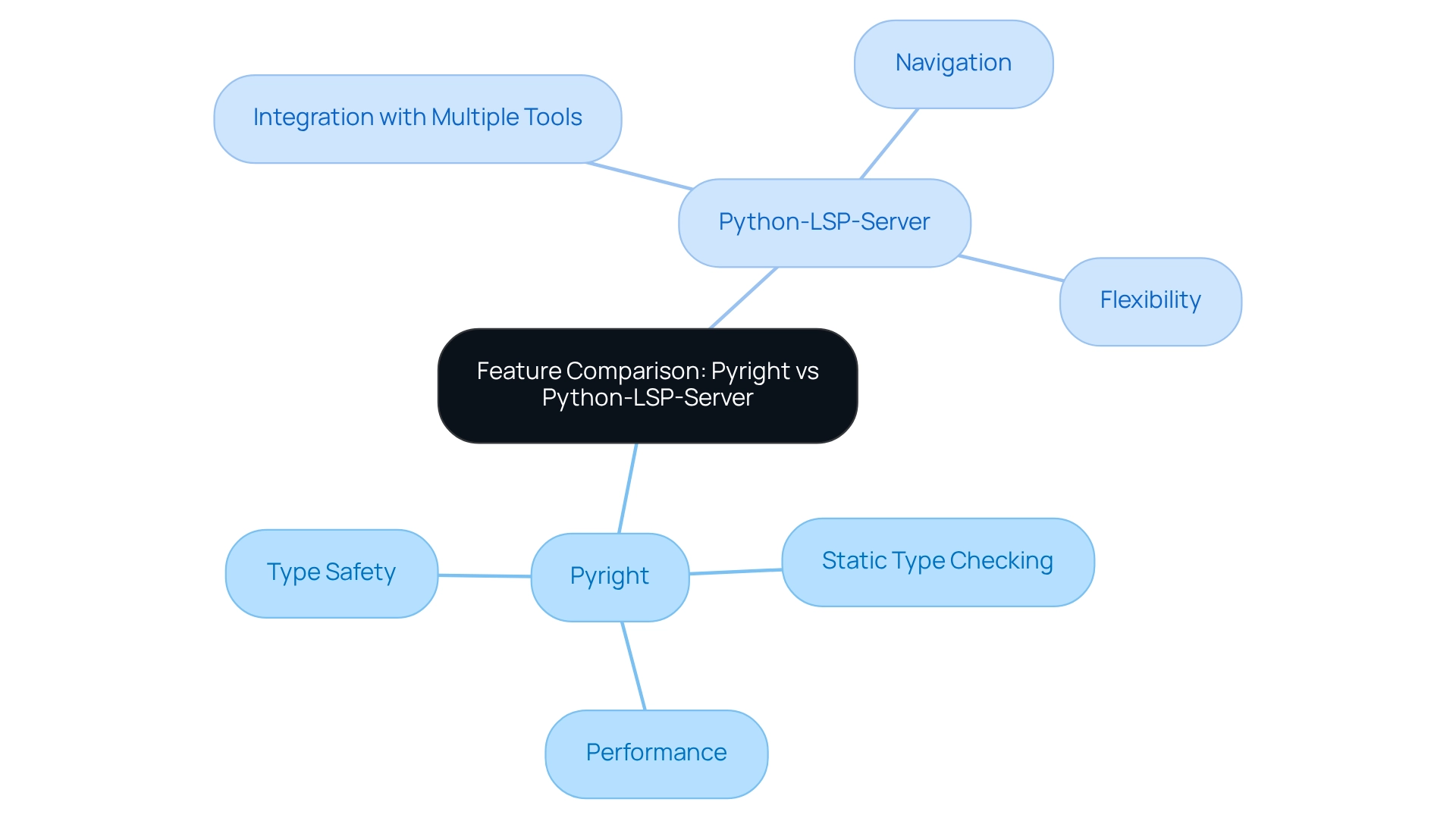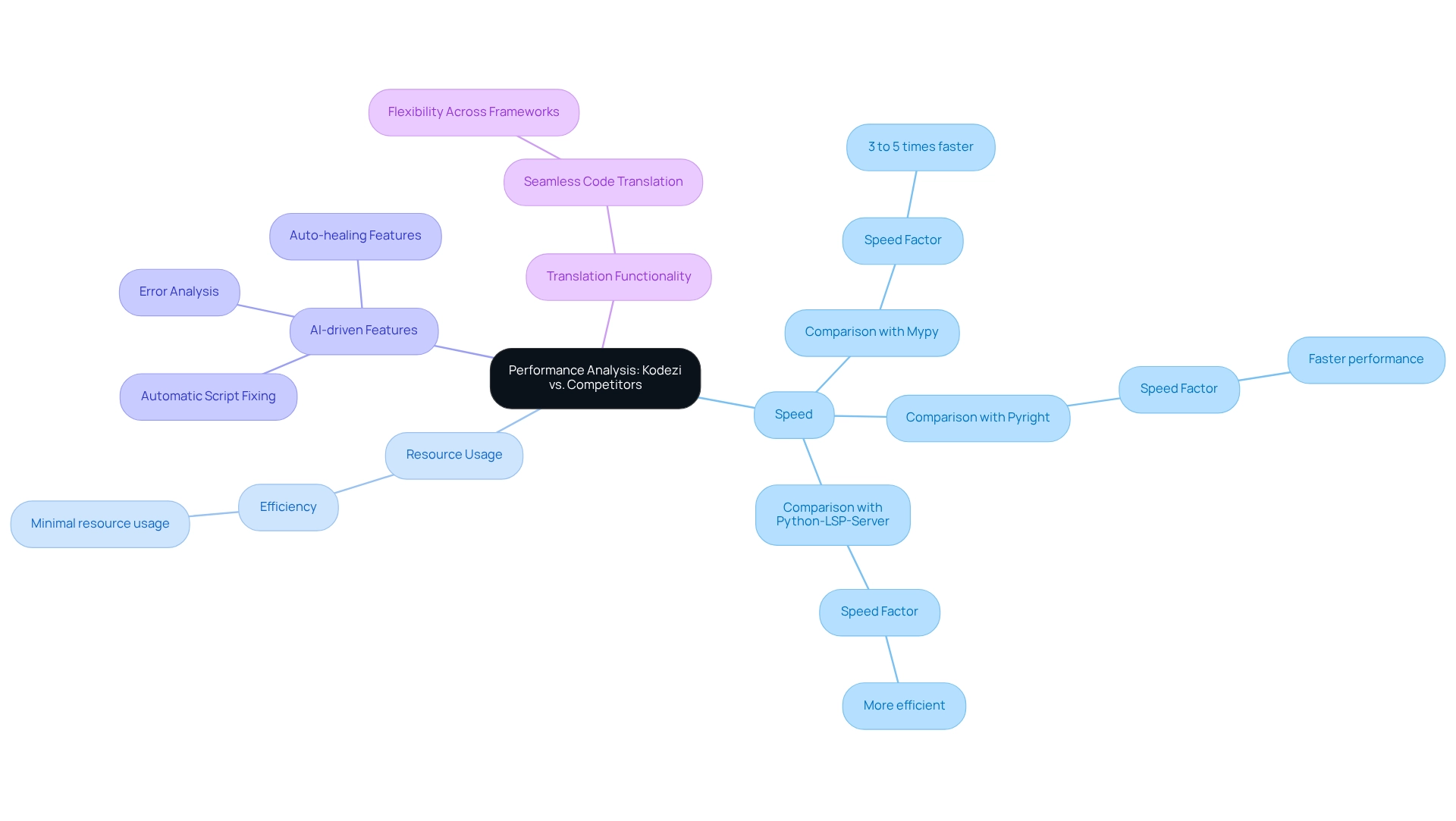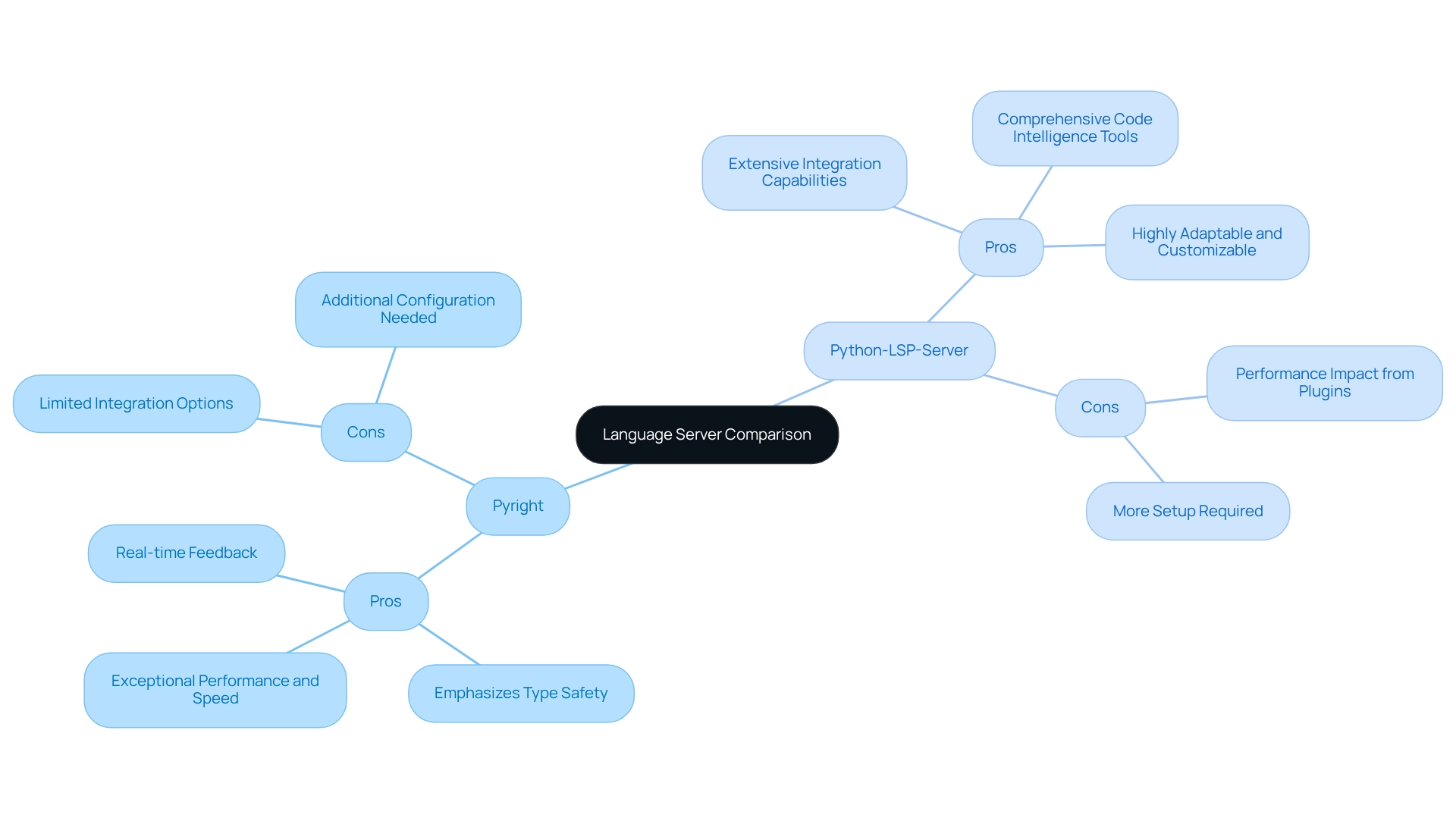Overview
The article addresses the challenges developers face in coding, particularly in managing Python programming efficiency. It compares Pyright and Python-LSP-Server, focusing on their key features and performance.
While Pyright excels in type safety and speed—especially for large codebases—Python-LSP-Server provides broader integration capabilities and advanced code intelligence tools. This makes the choice between them dependent on specific project needs and developer preferences.
Understanding these distinctions can significantly enhance productivity and code quality.
Introduction
In the realm of Python development, developers often face significant challenges that can hinder their coding efficiency and quality. How can the right tools make a difference? Enter Pyright and Python-LSP-Server, two standout options that address these challenges with unique features tailored to different needs.
- Pyright excels in static type checking and delivers exceptional performance, making it ideal for those managing large codebases and prioritizing reliability.
- On the other hand, Python-LSP-Server enhances the development experience through rich integration capabilities and comprehensive features such as auto-completion and error checking.
Understanding the strengths and weaknesses of these tools is paramount for fostering robust coding practices and optimizing productivity. Are you ready to explore how these tools can elevate your coding experience?
Overview of Pyright and Python-LSP-Server
In the ever-evolving landscape of Python programming, developers face numerous challenges, particularly when managing large codebases. Kodezi emerges as a solution to these coding hurdles, offering a high-performance static type checker optimized for Python. This tool emphasizes type safety and delivers real-time feedback, making it an invaluable resource for programmers striving for excellence in their work and ensuring maintainability.
Furthermore, Kodezi’s features extend beyond basic type checking. It integrates seamlessly with Python-LSP-Server (pylsp), which implements the Language Server Protocol for Python. This integration provides a suite of tools, including linters and formatters, enhancing the programming experience through functionalities such as auto-completion, error checking, and navigation. These capabilities position Kodezi as a versatile choice for developers seeking a comprehensive coding environment.
The tool supports Python versions 3.0 and newer, reflecting its relevance in modern practices. With detailed control over configurations, users can designate various execution environments for different segments of their source base, which proves especially beneficial in complex projects. Have you considered how such flexibility could streamline your workflow? Practical instances underscore the effectiveness of Kodezi in comparison to pyright vs python-lsp-server for enhancing software quality and programmer productivity. Case studies reveal that when comparing pyright vs python-lsp-server, Pyright, Kodezi’s static type checker, significantly boosts performance in large codebases. Similarly, the integration capabilities of pyright vs python-lsp-server streamline workflows across diverse development environments. Additionally, Kodezi’s automated programming debugging function allows programmers to quickly identify and rectify codebase issues, providing thorough explanations and insights into the problems encountered. This not only enhances performance but also ensures adherence to the latest security best practices and programming standards.
As we witness the growing adoption of static type checkers like Kodezi, it becomes clear that their role in fostering robust coding practices is vital. The increasing market share of these tools in Python programming reinforces their significance in today’s coding environment. Are you ready to explore the tools available on Kodezi’s platform and elevate your coding practices?

Feature Comparison: Pyright vs Python-LSP-Server
Developers often face significant challenges in maintaining code quality and efficiency. Kodezi addresses these hurdles with several advanced features that enhance the development experience.
- Static Type Checking is one such feature that provides real-time type checking and error detection, ensuring that code adheres to defined types. By identifying mistakes early in the development process, such as mismatched types, this tool aids in preventing runtime failures, which is essential for upholding code quality. This aligns with the case study on early error detection, highlighting how static typing can catch errors during compilation, preventing potential runtime failures.
- Incremental Updates are also a key benefit. Operating in 'watch' mode, Kodezi performs fast incremental updates when files are modified. This capability not only enhances programmer productivity but also streamlines the coding process, enabling prompt feedback on modifications.
- Additionally, Type Inference simplifies the coding process by automatically inferring types, reducing the need for explicit type annotations. This feature makes coding more accessible for developers while still maintaining type safety.
In conjunction with these attributes, Kodezi's automated program debugging abilities can further improve the creation experience. With the ability to instantly identify and resolve codebase issues, Kodezi provides detailed explanations and insights into what went wrong and how it was fixed. This swift problem-solving is crucial in agile processes, where upholding software quality and following security best practices are vital. Kodezi also effectively addresses performance bottlenecks, identifies security vulnerabilities, adds exception handling, and enhances formatting across the software in seconds, ensuring compliance with the latest coding standards.
On the other hand, when comparing pyright vs python-lsp-server, each offers a different set of strengths. Its Integration with Multiple Tools supports various plugins for linting, formatting, and code analysis, allowing developers to customize their development environment according to their specific needs. Furthermore, features like Navigation, including 'go to definition' and 'find references', improve exploration, facilitating a better understanding and navigation of extensive codebases. Similarly, Auto-completion offers intelligent suggestions based on context, significantly enhancing programming speed and efficiency.
In the comparison of pyright vs python-lsp-server, Pyright emphasizes type safety and performance, while Kodezi focuses on automated debugging and improvement, whereas Python-LSP-Server prioritizes flexibility and integration with other tools to cater to a broader range of development needs. The choice between these tools often depends on the specific requirements of the project and the developer's workflow preferences. A study analyzing data from 9,999 open-source projects found that programming languages and their associated tools significantly influence writing rates, underscoring the importance of selecting the right tool for optimal productivity. As Mohammad Rammal observed, "The ability to avoid numerous mistakes and improve code quality are significant assets in contemporary software creation," emphasizing how both Python-LSP-Server and Kodezi's debugging features aid in elevating code quality and avoiding errors. Additionally, adopting static typing, as demonstrated with a similar tool, can result in more dependable, effective, and manageable software, enhancing its importance in the programming toolkit.

Performance Analysis: Speed and Resource Usage
In the fast-paced world of software development, developers often encounter significant challenges related to code quality and performance. Kodezi stands out as a solution, offering remarkable speed that frequently surpasses conventional type checkers like mypy by a factor of 3 to 5, particularly in extensive codebases. This optimization for minimal resource usage positions Kodezi as an ideal choice for projects where performance is critical. Furthermore, while tools like pyright vs python-lsp-server may experience slower performance—especially when multiple plugins are in use—Kodezi ensures efficiency by delivering its extensive functionality without the lag. Users often commend Kodezi for its speed, acknowledging that while the comparison of pyright vs python-lsp-server shows that the latter offsets its resource requirements with a broader range of features, Kodezi provides a more streamlined experience that can be particularly beneficial in complex development situations.
In addition, Kodezi's AI-driven programming tool enhances productivity by automatically fixing scripts and analyzing errors, offering substantial benefits for programmers looking to optimize their workflow. The Kodezi CLI, frequently referred to as the Swiss-Army Knife for programmers, advances this concept further by providing auto-healing features for codebases, ensuring that developers can maintain optimal performance without the hassle of manual corrections.
Moreover, Kodezi's translation functionality improves flexibility, enabling programmers to transition seamlessly between various programming frameworks and languages. This balance between speed and functionality is crucial when selecting the right tool for specific needs. Recent benchmarks indicate that Kodezi's average speed significantly surpasses that of traditional type checkers, reinforcing its position as a top choice for performance-driven projects.
Are you ready to enhance your coding experience? Explore the innovative solutions Kodezi offers for automatic programming correction and productivity enhancement today.

Pros and Cons: Choosing the Right Language Server
Pyright
Pros:
- Exceptional performance and speed, particularly beneficial for large codebases, allowing for rapid development cycles.
- Emphasizes type safety and robust error detection, which significantly reduces debugging time and enhances code reliability.
- Provides real-time feedback, fostering a more efficient coding environment and enabling developers to address issues as they arise.
Cons:
- Limited integration options with other tools compared to Python-LSP-Server, which may restrict its usability in diverse development ecosystems.
- May necessitate additional configuration to optimize performance in specific environments, potentially increasing setup time for new users.
Python-LSP-Server
Pros:
- Offers extensive integration capabilities with a wide array of tools and plugins, making it adaptable to various development workflows.
- Features comprehensive code intelligence tools, including advanced navigation and auto-completion, which enhance programmer productivity.
- Highly adaptable and customizable, enabling programmers to adjust the server to satisfy their specific project needs.
Cons:
- Performance may be impacted by resource-intensive plugins, leading to slower response times in some scenarios.
- Often requires more setup and configuration to unlock its full potential, which can be a barrier for developers seeking quick implementation.
As Snehnath Neendoor, Senior Vice President of Business Development, notes, "Choosing the right tools is crucial for enhancing productivity and ensuring quality in development projects." This perspective underscores the importance of evaluating language servers based on specific project needs.
User testimonials highlight Kodezi's significant impact on debugging efficiency:
- A user from the Massachusetts Institute of Technology stated, "Kodezi has helped me find and fix bugs faster and easier than trying to manually. It is a lifesaver when it comes to correcting issues and bugs."
- Another user from the Indian Institute of Technology Delhi expressed appreciation for Kodezi, saying, "This is such a good website for debugging code, I truly appreciate the new updates every week and listening to our feedback! Thank you for this!"
- Ansgar, a Software Engineer, remarked, "I love what Kodezi is doing with debugging, feels like I just unlocked a new superpower!"
Ultimately, the decision regarding Pyright vs python-lsp-server hinges on the developer's specific needs and the nature of their projects. Each tool offers unique strengths that cater to different aspects of the development process, making it essential to evaluate them in the context of individual workflows.

Conclusion
The exploration of Pyright and Python-LSP-Server highlights the distinct challenges developers face in Python development. Pyright excels with its high-performance static type checking, ensuring type safety and real-time feedback. This feature is particularly beneficial for large codebases, making it a preferred choice for developers dedicated to maintaining code quality and reliability.
In addition, Python-LSP-Server enriches the development experience through robust integration capabilities. It supports various plugins that enhance auto-completion, error checking, and code navigation. This versatility appeals to developers who prioritize a customizable and feature-rich environment.
Ultimately, the decision between these tools hinges on the specific needs of the project and the developer’s workflow preferences. Whether you lean towards the speed and robustness of Pyright or the flexibility and integration offered by Python-LSP-Server, both tools play a significant role in enhancing coding efficiency and overall code quality. As the landscape of Python development continues to evolve, leveraging the strengths of these tools will be essential in fostering robust coding practices and optimizing productivity.
Frequently Asked Questions
What is Kodezi and how does it help Python developers?
Kodezi is a high-performance static type checker optimized for Python, designed to help developers manage large codebases. It emphasizes type safety and provides real-time feedback, making it a valuable resource for ensuring code maintainability and excellence.
What additional features does Kodezi offer beyond type checking?
Kodezi integrates with Python-LSP-Server (pylsp) to provide a suite of tools including linters, formatters, auto-completion, error checking, and navigation, enhancing the overall programming experience.
Which versions of Python does Kodezi support?
Kodezi supports Python versions 3.0 and newer, making it relevant for modern programming practices.
How does Kodezi handle complex projects?
Kodezi allows detailed control over configurations, enabling users to designate different execution environments for various segments of their source base, which is particularly beneficial for complex projects.
How does Kodezi compare to other tools like Pyright and Python-LSP-Server?
Case studies indicate that Kodezi, through its static type checker Pyright, significantly boosts performance in large codebases when compared to Python-LSP-Server. Additionally, its integration capabilities streamline workflows across diverse development environments.
What debugging features does Kodezi provide?
Kodezi includes an automated programming debugging function that helps programmers quickly identify and rectify issues within the codebase, offering thorough explanations and insights into the problems encountered.
Why is the adoption of static type checkers like Kodezi important?
The growing adoption of static type checkers like Kodezi is vital for fostering robust coding practices and ensuring adherence to the latest security best practices and programming standards in the evolving landscape of Python programming.




